2009日语专四 参考答案
- 格式:doc
- 大小:27.00 KB
- 文档页数:1

日语专四模拟试题及答案一、听力理解(共20分)1. 根据所听对话,选择正确答案。
- 问题:对话中提到的天气如何?A. 晴朗B. 多云C. 下雨答案:C2. 根据所听短文,回答以下问题。
- 问题:短文中提到的主人公去了哪里?答案:主人公去了图书馆。
二、词汇与语法(共30分)1. 选择填空。
- 例句:昨日はとても______でした。
A. 忙しいB. 忙しかったC. 忙しくて答案:B2. 将下列句子翻译成日语。
- 例句:明天是周末,我们可以去公园。
答案:明日は週末ですから、私たちは公園へ行けます。
三、阅读理解(共20分)1. 阅读以下短文,选择正确答案。
- 问题:短文中提到的活动是什么?A. 看电影B. 参加派对C. 去旅行答案:B2. 根据短文内容,回答问题。
- 问题:短文中的人物关系是什么?答案:他们是朋友。
四、完形填空(共15分)1. 阅读下面的短文,从括号内选择适当的选项填入空白处。
- 例句:彼は()に急に病気になりました。
A. 学校B. 家C. 仕事答案:B五、翻译(共15分)1. 将下列句子从日语翻译成中文。
- 例句:彼は新しい車を買いました。
答案:他买了一辆新车。
六、写作(共20分)1. 根据以下提示写一篇短文。
- 提示:描述你的一天。
- 答案:(考生需根据提示自行撰写短文)注:本试题及答案仅供参考,实际考试内容可能有所不同。
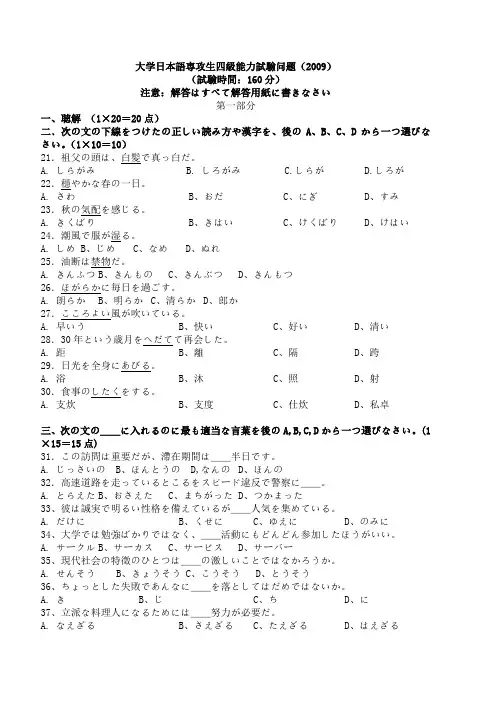
大学日本語専攻生四級能力試驗问题(2009)(試驗時間:160分)注意:解答はすべて解答用紙に書きなさい第一部分一、聴解(1×20=20点)二﹑次の文の下線をつけたの正しい読み方や漢字を、後のA、B、C、Dから一つ選びなさい。
(1×10=10)21.祖父の頭は、白髪で真っ白だ。
A. しらがみB. しろがみC.しらがD.しろが22.穩やかな春の一日。
A. さわB、おだC、にぎD、すみ23.秋の気配を感じる。
A. きくばりB、きはいC、けくばりD、けはい24.潮風で服が湿る。
A. しめ B、じめC、なめD、ぬれ25.油断は禁物だ。
A. きんふつB、きんものC、きんぶつD、きんもつ26.ほがらかに毎日を過ごす。
A. 朗らかB、明らかC、清らかD、郎か27.こころよい風が吹いている。
A. 早いうB、快いC、好いD、清い28.30年という歳月をへだてて再会した。
A. 距B、離C、隔D、跨29.日光を全身にあびる。
A. 浴B、沐C、照D、射30.食事のしたくをする。
A. 支炊B、支度C、仕炊D、私卓三、次の文の__に入れるのに最も適当な言葉を後のA,B,C,Dから一つ選びなさい。
(1×15=15点)31.この訪問は重要だが、滯在期間は__半日です。
A. じっさいのB、ほんとうの D,なんのD、ほんの32.高速道路を走っているとこるをスピード違反で警察に__。
A. とらえたB、おさえたC、まちがった D、つかまった33、彼は誠実で明るい性格を備えているが__人気を集めている。
A. だけにB、くせにC、ゆえにD、のみに34、大学では勉強ばかりではなく、__活動にもどんどん参加したほうがいい。
A. サークルB、サーカスC、サービスD、サーバー35、現代社会の特徵のひとつは__の激しいことではなかろうか。
A. せんそうB、きょうそう C、こうそうD、とうそう36、ちょっとした失敗であんなに__を落としてはだめではないか。
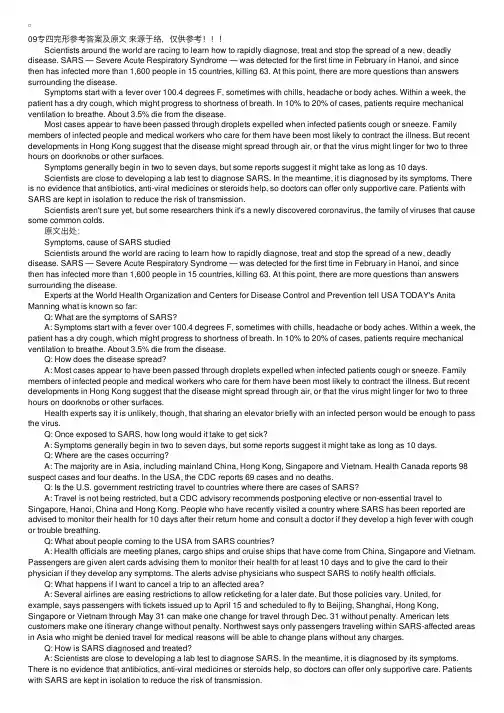
09专四完形参考答案及原⽂来源于络,仅供参考 Scientists around the world are racing to learn how to rapidly diagnose, treat and stop the spread of a new, deadly disease. SARS — Severe Acute Respiratory Syndrome — was detected for the first time in February in Hanoi, and since then has infected more than 1,600 people in 15 countries, killing 63. At this point, there are more questions than answers surrounding the disease. Symptoms start with a fever over 100.4 degrees F, sometimes with chills, headache or body aches. Within a week, the patient has a dry cough, which might progress to shortness of breath. In 10% to 20% of cases, patients require mechanical ventilation to breathe. About 3.5% die from the disease. Most cases appear to have been passed through droplets expelled when infected patients cough or sneeze. Family members of infected people and medical workers who care for them have been most likely to contract the illness. But recent developments in Hong Kong suggest that the disease might spread through air, or that the virus might linger for two to three hours on doorknobs or other surfaces. Symptoms generally begin in two to seven days, but some reports suggest it might take as long as 10 days. Scientists are close to developing a lab test to diagnose SARS. In the meantime, it is diagnosed by its symptoms. There is no evidence that antibiotics, anti-viral medicines or steroids help, so doctors can offer only supportive care. Patients with SARS are kept in isolation to reduce the risk of transmission. Scientists aren't sure yet, but some researchers think it's a newly discovered coronavirus, the family of viruses that cause some common colds. 原⽂出处: Symptoms, cause of SARS studied Scientists around the world are racing to learn how to rapidly diagnose, treat and stop the spread of a new, deadly disease. SARS — Severe Acute Respiratory Syndrome — was detected for the first time in February in Hanoi, and since then has infected more than 1,600 people in 15 countries, killing 63. At this point, there are more questions than answers surrounding the disease. Experts at the World Health Organization and Centers for Disease Control and Prevention tell USA TODAY's Anita Manning what is known so far: Q: What are the symptoms of SARS? A: Symptoms start with a fever over 100.4 degrees F, sometimes with chills, headache or body aches. Within a week, the patient has a dry cough, which might progress to shortness of breath. In 10% to 20% of cases, patients require mechanical ventilation to breathe. About 3.5% die from the disease. Q: How does the disease spread? A: Most cases appear to have been passed through droplets expelled when infected patients cough or sneeze. Family members of infected people and medical workers who care for them have been most likely to contract the illness. But recent developments in Hong Kong suggest that the disease might spread through air, or that the virus might linger for two to three hours on doorknobs or other surfaces. Health experts say it is unlikely, though, that sharing an elevator briefly with an infected person would be enough to pass the virus. Q: Once exposed to SARS, how long would it take to get sick? A: Symptoms generally begin in two to seven days, but some reports suggest it might take as long as 10 days. Q: Where are the cases occurring? A: The majority are in Asia, including mainland China, Hong Kong, Singapore and Vietnam. Health Canada reports 98 suspect cases and four deaths. In the USA, the CDC reports 69 cases and no deaths. Q: Is the U.S. government restricting travel to countries where there are cases of SARS? A: Travel is not being restricted, but a CDC advisory recommends postponing elective or non-essential travel to Singapore, Hanoi, China and Hong Kong. People who have recently visited a country where SARS has been reported are advised to monitor their health for 10 days after their return home and consult a doctor if they develop a high fever with cough or trouble breathing. Q: What about people coming to the USA from SARS countries? A: Health officials are meeting planes, cargo ships and cruise ships that have come from China, Singapore and Vietnam. Passengers are given alert cards advising them to monitor their health for at least 10 days and to give the card to their physician if they develop any symptoms. The alerts advise physicians who suspect SARS to notify health officials. Q: What happens if I want to cancel a trip to an affected area? A: Several airlines are easing restrictions to allow reticketing for a later date. But those policies vary. United, for example, says passengers with tickets issued up to April 15 and scheduled to fly to Beijing, Shanghai, Hong Kong, Singapore or Vietnam through May 31 can make one change for travel through Dec. 31 without penalty. American lets customers make one itinerary change without penalty. Northwest says only passengers traveling within SARS-affected areas in Asia who might be denied travel for medical reasons will be able to change plans without any charges. Q: How is SARS diagnosed and treated? A: Scientists are close to developing a lab test to diagnose SARS. In the meantime, it is diagnosed by its symptoms. There is no evidence that antibiotics, anti-viral medicines or steroids help, so doctors can offer only supportive care. Patients with SARS are kept in isolation to reduce the risk of transmission. Q: What kind of microbe is it, and where did it come from? A: Scientists aren't sure yet, but some researchers think it's a newly discovered coronavirus, the family of viruses that cause some common colds. Q: How worried are U.S. health experts? A: Health officials are concerned that it can spread quickly, and "could get much worse before it gets better," CDC Director Julie Gerberding says. Copyright 2005 The Associated Press. All rights reserved. This material may not be published, broadcast, rewritten or redistributed.。

南 京 林 业 大 学 试 卷日语专业四级考试模拟试卷(1)一 聴解(略) 二 次の文の下線をつけた単語の正しい読み方や漢字を、後のA、B、C、Dからひとつ選びなさい。
(1点×10=10点) 21.祖父の頭は、白髪で真っ白だ。
A.しらがみ B.しろかみ C.しらが D.しろが 22.穏やかな春の一日。
A.さわ B.おだ C.にぎ D.すみ 23.秋の気配を感じる。
A.きくばり B.きはい C.けくばり D.けはい 24.潮風で服が湿る。
A.しめ B.じめ C.なめ D.ぬれ 25.油断は禁物だ。
A.きんふつ B.きんもの C.きんぶつ D.きんもつ 26.ほがらかに毎日を過ごす。
A.朗らか B.明か C.清らか D.郎か 27.こころよい風が吹いている。
A.早い B.快い C.好い D.清い 28.30年という歳月をへだてて再会した。
A.距 B.離 C.隔 D.跨29.日光を全身にあびる。
A.浴 B.沐 C.照 D.射30.食事のしたくをする。
A.支炊 B.支度 C.仕炊 D.私卓三 次の文の下線に入れるのに最も適当な言葉を後のA、B、C、Dからひとつ選びなさい。
(1点×15=15点) 题号 一二 三 四 五 六 七 八 九 十 十一 十二 十三 十四 十五 总分 得分学 号 班 号 姓 名31.この訪問は重要だが、滞在期間は半日です。
A.じっさいのB.ほんとうのC.なんおD.ほんの32.高速道路を走っているところをスピード違反で警察に。
A.とらえたB.おさえたC.間違ったD.つかまった33.彼は誠実で明るい性格を備えているが人気を集めている。
A.だけにB.くせにC.ゆえにD.のみに34.大学では勉強ばかりではなく、活動にもどんどん参加したほうがいい。
A.サークルB.サーカスC.サービスD.サーバー35.現代社会の特徴の一つはの激しいことではなかろうか。
A.せんそうB.きょうそうC.こうそうD.とうそう36.ちょっとした失敗であんなにを落としてはだけではないか。
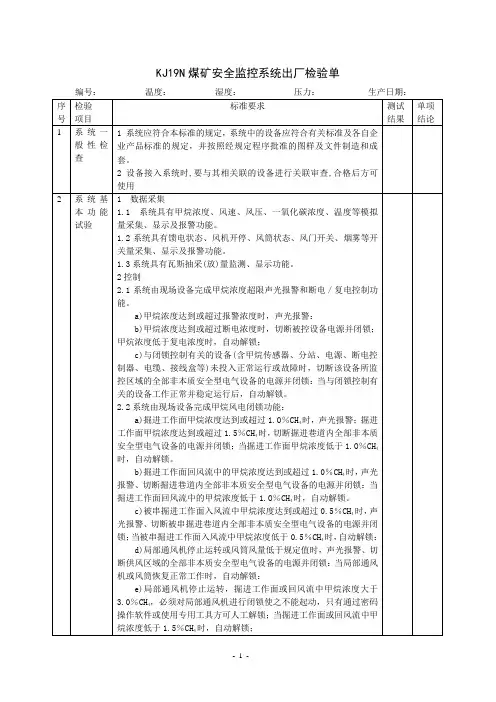
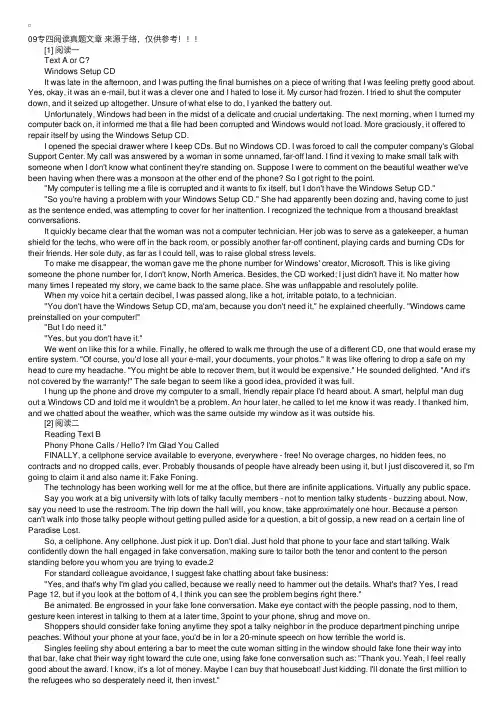
09专四阅读真题⽂章来源于络,仅供参考 [1] 阅读⼀ Text A or C? Windows Setup CD It was late in the afternoon, and I was putting the final burnishes on a piece of writing that I was feeling pretty good about. Yes, okay, it was an e-mail, but it was a clever one and I hated to lose it. My cursor had frozen. I tried to shut the computer down, and it seized up altogether. Unsure of what else to do, I yanked the battery out. Unfortunately, Windows had been in the midst of a delicate and crucial undertaking. The next morning, when I turned my computer back on, it informed me that a file had been corrupted and Windows would not load. More graciously, it offered to repair itself by using the Windows Setup CD. I opened the special drawer where I keep CDs. But no Windows CD. I was forced to call the computer company's Global Support Center. My call was answered by a woman in some unnamed, far-off land. I find it vexing to make small talk with someone when I don't know what continent they're standing on. Suppose I were to comment on the beautiful weather we've been having when there was a monsoon at the other end of the phone? So I got right to the point. "My computer is telling me a file is corrupted and it wants to fix itself, but I don't have the Windows Setup CD." "So you're having a problem with your Windows Setup CD." She had apparently been dozing and, having come to just as the sentence ended, was attempting to cover for her inattention. I recognized the technique from a thousand breakfast conversations. It quickly became clear that the woman was not a computer technician. Her job was to serve as a gatekeeper, a human shield for the techs, who were off in the back room, or possibly another far-off continent, playing cards and burning CDs for their friends. Her sole duty, as far as I could tell, was to raise global stress levels. To make me disappear, the woman gave me the phone number for Windows' creator, Microsoft. This is like giving someone the phone number for, I don't know, North America. Besides, the CD worked; I just didn't have it. No matter how many times I repeated my story, we came back to the same place. She was unflappable and resolutely polite. When my voice hit a certain decibel, I was passed along, like a hot, irritable potato, to a technician. "You don't have the Windows Setup CD, ma'am, because you don't need it," he explained cheerfully. "Windows came preinstalled on your computer!" "But I do need it." "Yes, but you don't have it." We went on like this for a while. Finally, he offered to walk me through the use of a different CD, one that would erase my entire system. "Of course, you'd lose all your e-mail, your documents, your photos." It was like offering to drop a safe on my head to cure my headache. "You might be able to recover them, but it would be expensive." He sounded delighted. "And it's not covered by the warranty!" The safe began to seem like a good idea, provided it was full. I hung up the phone and drove my computer to a small, friendly repair place I'd heard about. A smart, helpful man dug out a Windows CD and told me it wouldn't be a problem. An hour later, he called to let me know it was ready. I thanked him, and we chatted about the weather, which was the same outside my window as it was outside his. [2] 阅读⼆ Reading Text B Phony Phone Calls / Hello? I'm Glad You Called FINALLY, a cellphone service available to everyone, everywhere - free! No overage charges, no hidden fees, no contracts and no dropped calls, ever. Probably thousands of people have already been using it, but I just discovered it, so I'm going to claim it and also name it: Fake Foning. The technology has been working well for me at the office, but there are infinite applications. Virtually any public space. Say you work at a big university with lots of talky faculty members - not to mention talky students - buzzing about. Now, say you need to use the restroom. The trip down the hall will, you know, take approximately one hour. Because a person can't walk into those talky people without getting pulled aside for a question, a bit of gossip, a new read on a certain line of Paradise Lost. So, a cellphone. Any cellphone. Just pick it up. Don't dial. Just hold that phone to your face and start talking. Walk confidently down the hall engaged in fake conversation, making sure to tailor both the tenor and content to the person standing before you whom you are trying to evade.2 For standard colleague avoidance, I suggest fake chatting about fake business: "Yes, and that's why I'm glad you called, because we really need to hammer out the details. What's that? Yes, I read Page 12, but if you look at the bottom of 4, I think you can see the problem begins right there." Be animated. Be engrossed in your fake fone conversation. Make eye contact with the people passing, nod to them, gesture keen interest in talking to them at a later time, 3point to your phone, shrug and move on. Shoppers should consider fake foning anytime they spot a talky neighbor in the produce department pinching unripe peaches. Without your phone at your face, you'd be in for a 20-minute speech on how terrible the world is. Singles feeling shy about entering a bar to meet the cute woman sitting in the window should fake fone their way into that bar, fake chat their way right toward the cute one, using fake fone conversation such as: "Thank you. Yeah, I feel really good about the award. I know, it's a lot of money. Maybe I can buy that houseboat! Just kidding. I'll donate the first million to the refugees who so desperately need it, then invest." You'd want, of course, to carry this fake conversation on at a high volume as you approach the cute one. And then you should pretend your fake caller has to go, leaving you abruptly alone. Look sad. If the cute one starts up a conversation with you and asks you about the award or the refugees, well, you're on your own.4 One important caution about fake foning. The other day I was fake foning my way past a colleague, and he was actually following me to get my attention. I knew he wanted to ask about a project I had not yet finished. I was trying to buy myself some time, so I continued fake foning with my doctor. "So I don't need the operation? Oh, doctor, that is the best news." And then: Brrrrrrng! Brrrrrrng! Brrrrrrng! My phone started ringing, right there while it was planted on my face. My colleague looked at me, and I at him, and naturally I gasped. "What is the matter with this thing?" I said, pulling the phone away to look at it, and then putting it back to my ear. "Hello? Are you still there?" Oops [3] 阅读三 Reading Text D The Card Tactic Not long ago, a mysterious Christmas card dropped through our mail slot. The envelope was addressed to a man named Raoul, who, I was relatively certain, did not live with us. The envelope wasn't sealed, so I opened it. The inside of the card was blank. My husband explained that the card was both from and to the newspaper deliveryman. His name was apparently Raoul, and Raoul wanted a holiday tip. We were meant to put a check inside the card and then drop the envelope in the mail. When your services are rendered at 4 a.m., you can't simply hang around, clearing your throat like a bellhop. You have to be direct. So I wrote a nice holiday greeting to this man whom I had never seen or met, this man who, in my imagination, fires The New York Times from a howitzer aimed at our front door, causing more noise with mere newsprint than most people manage with sophisticated black market fireworks. With a start, I realized that perhaps the reason for the 4 a.m. wake-up thonks was not ordinary rudeness but carefully executed spite: I had not tipped Raoul in Christmases past. I honestly hadn't realized I was supposed to. This was the first time he'd used the card tactic. So I got out my checkbook. Somewhere along the line, holiday tipping went from an optional thank-you for a year of services well rendered to a Mafia-style protection racket. Several days later, I was bringing our garbage bins back from the curb when I noticed an envelope taped to one of the lids. The outside of the envelope said MICKEY. Unless a small person named Mickey had taken up residence in our garbage can and this missive was intended for him, it had to be another tip solicitation, this time from our garbage collector. Unlike Raoul, Mickey hadn't enclosed his own Christmas card from me. In a way, I appreciated the directness. "I know you don't care how merry my Christmas is, and that's fine," the gesture said. "I want $30, or I'll 'forget' to empty your compost bin some hot summer day."。
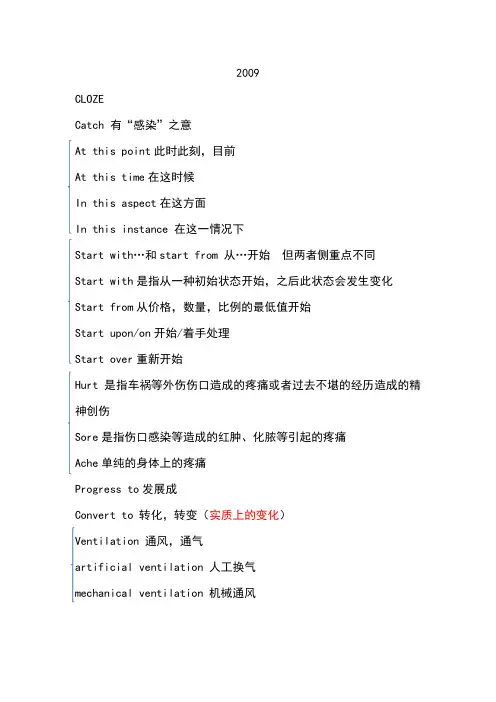
2009CLOZECatch 有“感染”之意At this point此时此刻,目前At this time在这时候In this aspect在这方面In this instance 在这一情况下Start with…和start from 从…开始但两者侧重点不同Start with是指从一种初始状态开始,之后此状态会发生变化Start from从价格,数量,比例的最低值开始Start upon/on开始/着手处理Start over重新开始Hurt是指车祸等外伤伤口造成的疼痛或者过去不堪的经历造成的精神创伤Sore是指伤口感染等造成的红肿、化脓等引起的疼痛Ache单纯的身体上的疼痛Progress to发展成Convert to 转化,转变(实质上的变化)Ventilation 通风,通气artificial ventilation 人工换气mechanical ventilation 机械通风cultivate 培养(技能、态度、素质等方面得以发展)foster 培养(技能、感情、思想方面发展)develop 产生新想法,设计新产品、体系等design 为某个目的开发新产品时,多用于被动语态there is no evidence that在正式用语中,contract有“感染”(疾病,恶习)之意Transmission 传播,常用于正式场合,指疾病的传播Transformation彻底的改变,变形Newly指very recently.常与动词过去分词搭配使用Lately最近,但不与动词过去分词搭配使用Newborn adj/n. 新生的,新生儿Renewed adj.更新的,重建的Pass through 通过,穿过Care for照顾,照料Care about 关心,关注Ailment 指不太严重的小病,尤指慢性病G&V51.how about doing sth.=what about doing sth.做…怎么样55.price:high/lowPercentage:large/small56.i was very interested in ___she told me.A.all thatB.all whichC.all whatD.that 答案[A]注:当先行词是不定代词,anything,nothing,the one,all,much, Few,any,little等,关系代词只能用that57.we consider___he should have left without telling anyone Beforehead.A.strange whyB.it strange whatC.it strange thatD.that strange注:consider sth.adj.但当宾语是句子时用it作形式宾语。
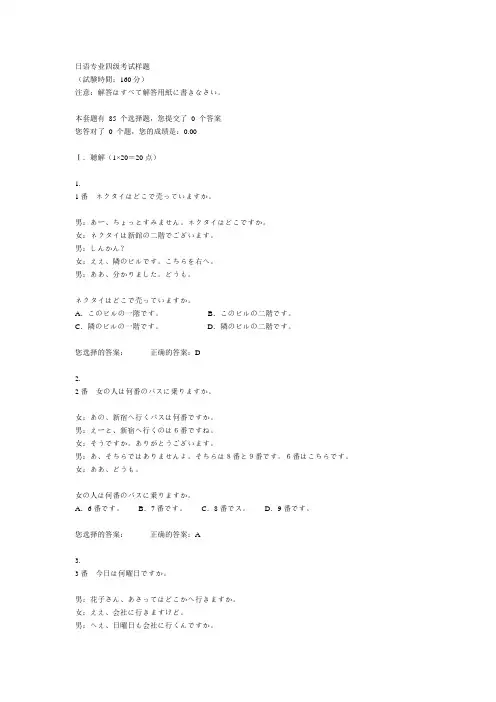
日语专业四级考试样题(試験時間:160分)注意:解答はすべて解答用紙に書きなさい。
本套题有85 个选择题,您提交了0 个答案您答对了0 个题,您的成绩是:0.00Ⅰ.聴解(1×20=20点)1.1番ネクタイはどこで売っていますか。
男:あー、ちょっとすみません。
ネクタイはどこですか。
女:ネクタイは新館の二階でございます。
男:しんかん?女:ええ、隣のビルです。
こちらを右へ。
男:ああ、分かりました。
どうも。
ネクタイはどこで売っていますか。
A.このビルの一階です。
B.このビルの二階です。
C.隣のビルの一階です。
D.隣のビルの二階です。
您选择的答案:正确的答案:D2.2番女の人は何番のバスに乗りますか。
女:あの、新宿へ行くバスは何番ですか。
男:えーと、新宿へ行くのは6番ですね。
女:そうですか。
ありがとうございます。
男:あ、そちらではありませんよ。
そちらは8番と9番です。
6番はこちらです。
女:ああ、どうも。
女の人は何番のバスに乗りますか。
A.6番です。
B.7番です。
C.8番でス。
D.9番です。
您选择的答案:正确的答案:A3.3番今日は何曜日ですか。
男:花子さん、あさってはどこかへ行きますか。
女:ええ、会社に行きますけど。
男:へえ、日曜日も会社に行くんですか。
女:いいえ、あさっては土曜日ですよ。
男:あれ、今日は金曜日でしょう。
女:いいえ、違いますよ。
男:あ、そうか。
今日は何曜日ですか。
A.木曜日です。
B.金曜日です。
C.土曜日です。
D.日曜日です。
您选择的答案:正确的答案:A4.4番男の人は昨日何をしましたか。
女:小林さん、昨日何をしましたか。
男:本を読んでいました。
女:じゃあ、うちにいたんですか。
男:いいえ。
女:あ、じゃあ、図書館?男:いいえ、天気がよかったから公園で。
女:ああ、いいですね。
男の人は昨日何をしましたか。
A.うちにいました。
B.公園で遊びました。
C.図書館に行きました。
D.外で本を読みました。
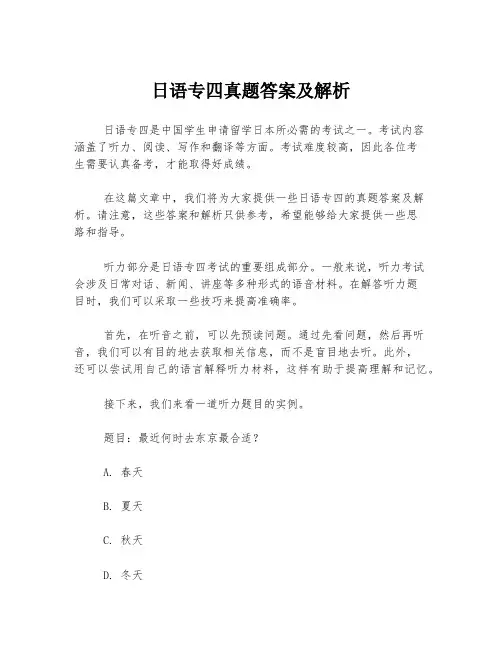
日语专四真题答案及解析日语专四是中国学生申请留学日本所必需的考试之一。
考试内容涵盖了听力、阅读、写作和翻译等方面。
考试难度较高,因此各位考生需要认真备考,才能取得好成绩。
在这篇文章中,我们将为大家提供一些日语专四的真题答案及解析。
请注意,这些答案和解析只供参考,希望能够给大家提供一些思路和指导。
听力部分是日语专四考试的重要组成部分。
一般来说,听力考试会涉及日常对话、新闻、讲座等多种形式的语音材料。
在解答听力题目时,我们可以采取一些技巧来提高准确率。
首先,在听音之前,可以先预读问题。
通过先看问题,然后再听音,我们可以有目的地去获取相关信息,而不是盲目地去听。
此外,还可以尝试用自己的语言解释听力材料,这样有助于提高理解和记忆。
接下来,我们来看一道听力题目的实例。
题目:最近何时去东京最合适?A. 春天B. 夏天C. 秋天D. 冬天解析:在这道题中,我们需要通过听力材料来得知最近何时去东京最合适。
在听音之前,我们可以预读问题,有目的地去寻找与时间有关的线索。
通过仔细听音,我们可以得知“东京的夏天非常炎热,而冬天很冷”,因此最近去东京最合适的时间应该是春天或秋天。
进一步分析,秋天的天气一般来说比较宜人,因此正确答案应该是C. 秋天。
阅读部分是日语专四考试中的另一个重要组成部分。
阅读理解能力是考生们需要重点培养的能力之一。
在解答阅读题目时,我们可以采取一些技巧来提高准确率。
首先,在阅读之前,可以先预览文章的标题、副标题和段落开头,了解大致内容。
然后,再仔细阅读文章,一段一段地理解。
在阅读过程中,可以注意标点符号和段落的划分,这有助于理解文章的结构和逻辑。
接下来,我们来看一道阅读题目的实例。
题目:根据文章,以下哪个选项最符合作者的意图?A. 表达对自然环境的关注B. 讲述动物保护的重要性C. 探讨人类在生态平衡中的作用D. 分析发生在世界各地的自然灾害解析:在这道题中,我们需要根据文章的内容来判断作者的意图。
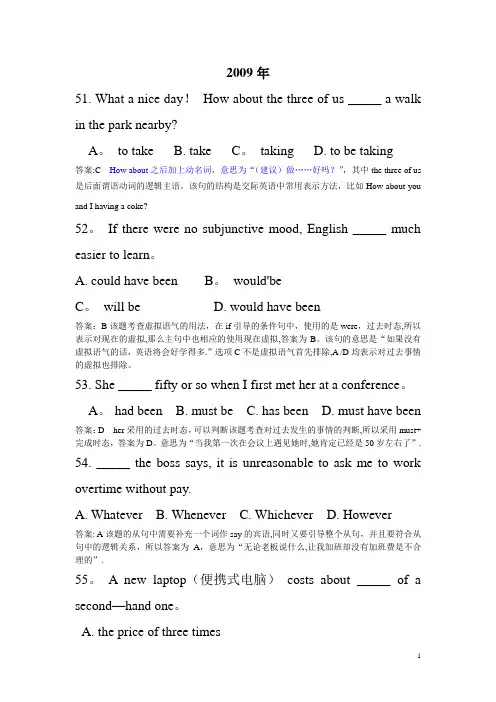
2009年51.What a nice day!How about the three of us _____ a walk in the park nearby?A。
to take B. take C。
taking D. to be taking答案:C How about之后加上动名词,意思为“(建议)做……好吗?”,其中the three of us 是后面谓语动词的逻辑主语。
该句的结构是交际英语中常用表示方法,比如How about you and I having a coke?52。
If there were no subjunctive mood, English _____ much easier to learn。
A. could have been B。
would'beC。
will be D. would have been答案:B该题考查虚拟语气的用法,在if引导的条件句中,使用的是were,过去时态,所以表示对现在的虚拟,那么主句中也相应的使用现在虚拟,答案为B。
该句的意思是“如果没有虚拟语气的话,英语将会好学得多.”选项C不是虚拟语气首先排除,A /D均表示对过去事情的虚拟也排除。
53. She _____ fifty or so when I first met her at a conference。
A。
had been B. must be C. has been D. must have been答案:D her采用的过去时态,可以判断该题考查对过去发生的事情的判断,所以采用must+完成时态,答案为D。
意思为“当我第一次在会议上遇见她时,她肯定已经是50岁左右了”.54. _____ the boss says, it is unreasonable to ask me to work overtime without pay.A. WhateverB. WheneverC. WhicheverD. However答案: A该题的从句中需要补充一个词作say的宾语,同时又要引导整个从句,并且要符合从句中的逻辑关系,所以答案为A,意思为“无论老板说什么,让我加班却没有加班费是不合理的”.55。
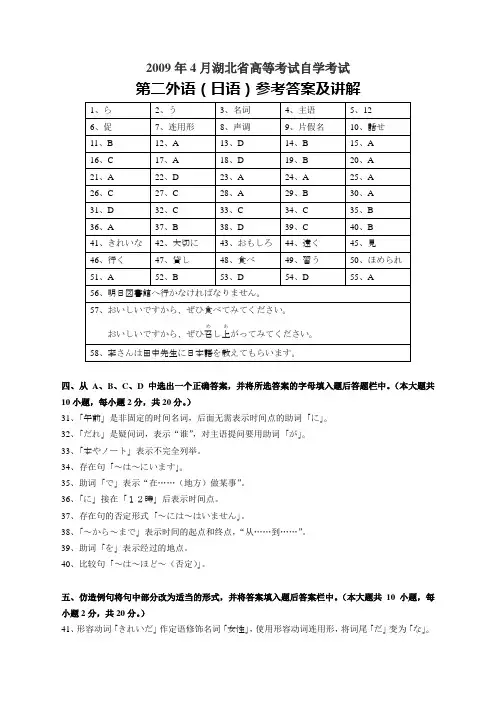
2009年4月湖北省高等考试自学考试第二外语(日语)参考答案及讲解四、从A、B、C、D中选出一个正确答案,并将所选答案的字母填入题后答题栏中。
(本大题共10小题,每小题2分,共20分。
)31、「午前」是非固定的时间名词,后面无需表示时间点的助词「に」。
32、「だれ」是疑问词,表示“谁”,对主语提问要用助词「が」。
33、「本やノート」表示不完全列举。
34、存在句「~は~にいます」。
35、助词「で」表示“在……(地方)做某事”。
36、「に」接在「12時」后表示时间点。
37、存在句的否定形式「~には~はいません」。
38、「~から~まで」表示时间的起点和终点,“从……到……”。
39、助词「を」表示经过的地点。
40、比较句「~は~ほど~(否定)」。
五、仿造例句将句中部分改为适当的形式,并将答案填入题后答案栏中。
(本大题共10小题,每小题2分,共20分。
)41、形容动词「きれいだ」作定语修饰名词「女性」,使用形容动词连用形,将词尾「だ」变为「な」。
42、形容动词「大切だ」后续动词「し」(する连用形),使用动词连用形,将词尾「だ」变为「に」。
43、此句中「そうです」表示样态,前接形容词时去掉词尾「い」。
44、形容词「遠い」后续「て」,使用形容词连用形,将词尾「い」变为「く」。
45、一段动词「見る」后续「ない」,使用动词的未然形,去掉词尾「る」。
46、「でしょう」表推测,前接动词终止形,可用动词「行く」的基本形。
47、五段动词「貸す」后续「て」,使用动词连用形,将词尾「す」变成「し」。
48、「すぎる」前接动词的连用形(ます形)。
49、「こと」是形式名词,前接动词的连体形,可用动词「習う」的基本形。
50、此句是被动句,翻译成“被老师骂”,「ほめる」的被动态是「ほめられる」,后续「ました」是「ほめられました」。
六、从A、B、C、D中选出一个正确答案,并将所选答案的字母填入题后答题栏中。
(本大题共5小题,每小题3分,共15分。
大学日本語専攻生四級能力試驗问题(2009)(試驗時間:160分)注意:解答はすべて解答用紙に書きなさい第一部分一、聴解(1×20=20点)五、次の文章の()に入る最も適当な言葉を、後のA , B , C , Dから一つ選びなさい。
日本は欧米の先進国がインフレや失業問題に(61)いるのにひきかえ〔1〕、順調な足どりで経済成長を遂げてきた。
ここにきて(62)、日本人は世界的視野に立って、產業社会の変化への対応、人間としての生き方、労働に対する考え方などを自問する(63)。
その萌芽は日本が成熟社会に入ったといわれる一九七〇年代からすでにあった。
(64)、日本型產業構造にまでメスが入り、積極的に企業改革に取り組みは始めてから、まだ日は浅い。
では、具体的な変化のきざし〔3〕はどのようなところに現れているのだろうか。
產業構造が転換期を迎えたこと(65)、雇用情勢は揺れ動いている。
(66)、国鉄、造船、鉄鋼などの業界の人減らし、都会を中心とする第三次産業の膨張とその産業の雇用人数の増加、国際化、情報化に伴う新たな人材への需要、終身雇用や年功序列〔4〕といった日本的な雇用制度の変化など、雇用情勢の様変わりが激しい。
(67)、集団主義、帰属主義という意識が、若者を中心に薄れてきている。
消費多様化時代になって、旧来の集団主義的な発想は(68)。
次世代を担う若者たちの間では旧世代がとまどう〔6〕ほど私生活中心の個人主義が徹底している。
自分の時間を大切にするから残業などやりたがらない。
職場ヘの帰属意識が薄いから、いやになればすぐにやめて別の仕事に就く。
規制をされないで、自由にのびのびと生きることを(69)。
有名大学に入って、大企業、有名企業に就職し、安定した人生設計を望んでいる若者が根強く存在することも事実である。
しかし、終身雇用などなんのその、生活を楽しむことを第一義に考える短時間制社員や就職を希望しない若者たちが一方で数を増やしている。
第一次作业论述题请把短文译成中文:(1)田中さんは??不足のために、最近からだの?子がよくありません。
体にいいので、王さんは田中さんに太?拳を教えてあげました。
田中さんは、王さんに教えてもらいました。
先?の休みに、王さんが家へ教えに来てくれました。
「力を入れないで、ゆっくり体を?かしてください。
」と、王さんが言いました。
(2)田中さんは普段忙しいために、なかなか??する?会がありません。
そこで、王さんに太?拳を教えてもらいました。
日本でも、太?拳は最近人?があります。
初めての人に、太?拳を教えてくれる教室もあります。
日本人の生活のしかたは、昔と比べて、?わりました。
体を?かさないで、机の前に座って生活する人が?えました。
??不足のために、病?になる人もいます。
最近では、健康を考えて、スポ?ツを始める人が?えました。
大きな都市には、たいてい、スポ?ツセンタ?があります。
希望すれば、??のコ?チが、指?してくれます。
道具も、?してもらえます。
特に?末には、たくさんの人が利用しています。
参考答案:⑴ 田中因为缺少体育锻炼,最近身体状况欠佳。
因为对身体有好处,所以小王教田中打太极拳。
田中请小王教他。
上周的休息日小王到家里来教太极拳。
小王说:"不要用力,慢慢地活动身体。
" ⑵ 田中平时很忙,很少有锻炼身体的机会,于是,他请小王教他太极拳。
近来,太极拳在日本很受欢迎,还开办了教初学者太极拳的训练班。
日本人的生活方式和以前相比有了变化。
不活动身体,坐在桌子前面生活的人增加了,也有人因缺少运动而得了病。
最近,考虑到身体健康而开始运动的人多了起来。
大城市里一般都有体育活动中心。
如果你想学,专业教练会给予指导,还可以租用运动器械。
特别是周末,利用的人很多。
单选题答案 1-5 CBDDB 6-10 CABDD1、国���をかけたいんですが、___いいですか。
A:どちらがB:どうやってC:どうすればD:どうして答案:C2、外国�が上手になる____、大�の人が�学�座を�いています。
2009年大学日语四级考试试题试卷一Ⅰ聴解セクション(听解部分)(20分間)一、写真問題(图片题)写真か絵を見て質問に答えてください。
はじめに写真か絵について質問します。
その後で文を四つ言います。
その四つの中から正しい答えを一つ選んでください。
文は1回しか言いません。
まず例題をしてみましょう。
例題(可先在试卷上选,然后划到答题卡上,下同。
)答えはAです。
このような問題は1から5まであります。
それでは、問題を始めます。
1.2.3.4.5.二、応答問題(应答题)始めに一人が短い文を一つ言う。
その後でもう一人がそれに答える。
正しい答えを[A][B][C][D]から、一つ選んでください。
文は一回しか言いない。
まず例題をしてみよう。
例題[A] [B] [C] [D]答えはAです。
このような問題は6から10まであります。
それでは、問題を始めます。
6.[A] [B] [C] [D] 7.[A] [B] [C] [D]8.[A] [B] [C] [D] 9.[A] [B] [C] [D]10.[A] [B] [C] [D]三、会話問題(对话题)会話を聞いて、質問に答えてください。
質問は会話を聞く前と聞いた後2回言います。
正しい答えを[A][B][C][D]から、一つ選んでください。
会話は一回しか言いません。
まず例題をしてみましょう。
例題[A] 水曜日 [B] 木曜日[C] 金曜日 [D] 土曜日答えはAです。
このような問題は11から20まであります。
それでは、問題を始めます。
11.[A] [B] [C] [D]12.[A] 1回 [B]2回 [C]3回 [D]4回13.[A]勉強のこと [B]病院のこと [C]警察のこと [D]山田さんのこと14.[A]暇だ [B]大変だ [C]忙しい [D]あまり忙しくない15.[A]四人 [B]三人 [C]二人 [D]一人16.[A]郵便局 [B]図書館 [C]銀行 [D]病院17.[A]謝る場合 [B]訪問する場合 [C]買い物する場合 [D]打ち合わせる場合18.[A]また田中さんを訪問する [B]田中さんが来るのを待つ[C]また田中さんに電話する [D]田中さんからの電話を待つ19.[A]コーヒーを飲みました [B]お茶を飲みました[C]両方とも飲みました[D]何も飲みませんでした20.[A]CD [B]お菓子 [C]はがき [D]ハンカチⅡ文字と語彙セクション(20分間)一、次ののことばの読み方を、それぞれ[A][B][C][D]から一つ選びなさい。
2009专四语法题PART IV GRAMMAR & VOCABULARY [15 MIN]There are thirty sentences in this section. Beneath each sentence there are four words or phrases marked A, B, C and D. Choose one word or phrase that best completes the sentence. Mark your answers on Answer Sheet Two.51. What a nice day! How about the three of us _____ a walk in the park nearby?A. to takeB. takeC. takingD. to be taking52. If there were no subjunctive mood, English _____ much easier to learn.A. could have beenB. would beC. will beD. would have been53. She _____ fifty or so when I first met her at a conference.A. had beenB. must beC. has beenD. must have been54. _____ the boss says, it is unreasonable to ask me to work overtime without pay.A. WhateverB. WheneverC. WhicheverD. However55. A new laptop costs about _____ of a second-hand one.A. the price of three timesB. three times the priceC. as much as the three times priceD. three times more than the price56. I was very interested in _____ she told me.A. all thatB. all whichC. all whatD. that57. We consider ______ he should have left without telling anyone beforehand.A. strange whyB. it strange whatC. it strange thatD. that strange58. It is going to be fine tomorrow. _______.A. So is it.B. So it is.C. So it does.D. So does it.59. Little _____ about her own safety, though she herself was in great danger.A. she caredB. she may careC. may she careD. did she care60. The couple had no sooner got to the station _____ the coach left.A. whenB. asC. untilD. than61. Aren't you tired? I ____ you had done enough for today.A. should have thoughtB. must have thoughtC. might have thoughtD. could have thought62. "It seems that she was there at the conference." The sentence means thatA. she seems to be there at the conference.B. she seemed to be there at the conference.C. she seems to have been there at the conference.D. she seemed to being there at the conference.63. Which of the following adverbs can NOT be used to complete " _____ everybody came"?A. NearlyB. QuiteC. PracticallyD. Almost64. In "How much do you think he earns?" how much is ______ of the sentence.A. the subjectB. the adverbialC. the objectD. the complement65. "The man preparing the documents is the firm's lawyer" has all the following possible meanings EXCEPTA. the man who has prepared the documents...B. the man who has been preparing the documents...C. the man who is preparing the documents...D. the man who will prepare the documents...66. During the TV interview, the singer announced that he was going to _____ his new album soon.A. releaseB. renewC. relieveD. rehearse67. After working for the firm for ten years, he finally _____ the rank of deputy director.A. achievedB. approachedC. attainedD. acquired68. Winter is the _____ season at most hotels in this seaside town, because very few tourists come to stay.A. slowB. slackC. lowD. quiet69. Come on, Jack, tell me the story. Don't keep me in ______.A. suspenseB. suspendingC. suspensionD. suspender70. The football match was _____ because of the heavy rain.A. called overB. called upC. called outD. called off71. We had a good time there, and the food was plentiful and _____.A. conduciveB. wholesomeC. helpfulD. appreciative72. It was strange that she would _____ such an absurd idea.A. allowB. stickC. takeD. entertain73. The scientists have made an _____ study of the viruses that cause the disease.A. exhaustedB. exhaustingC. exhaustiveD. exhaustion74. Do you own your apartment or are you a ______ ?A. tenantB. customerC. clientD. proprietor75. Representatives from the companies indicated that they should go on working together in _____.A. unityB. entityC. partnersD. partnership76. We all know that Mary has had a strict _____.A. growthB. upbringingC. developmentD. cultivation77. The drink was packaged in champagne bottles and was being _____ as the real stuff.A. passed outB. passed byC. passed overD. passed off78. Last Sunday she came to visit us . The italicized phrase meansA. unexpectedlyB. unhappilyC. untidilyD. unofficially79. The person he interviewed was _____ his former schoolmate.A. no other thanB. no more thanC. none other thanD. none the less80. The young employee has a(n)______ quality --- he is totally honest.A. respectableB. admirableC. decentD. approachable2009年专四语法与词汇答案51.C 52.B 53.D 54.A 55.B 56.A 57.C 58.B 59.D 60.D 61.A 62.C 63.B 64.C 65.D 66.A 67.C 68.B 69.A 70.D 71.B 72.D 73.C 74.A 75.D 76.B 77.D 78.A 79.C 80.C51. CTIP:How about之后加上动名词,意思为“(建议)做,好吗?”,其中the three of us 是后面谓语动词的逻辑主语。